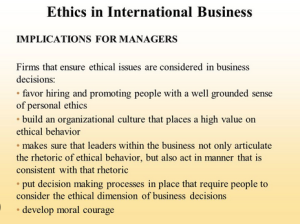Business ethics in international transactions is crucial for fostering trust, building relationships, and ensuring sustainable and responsible business practices across borders. As companies operate globally, they encounter diverse cultures, legal systems, and business environments, making ethical considerations even more complex. Here are key principles and considerations for maintaining ethical standards in international transactions:

Business Ethics in International Transactions
-
Table of Contents
ToggleCompliance with Laws and Regulations:
- Adhere to local and international laws and regulations in each country where the business operates. Ensure compliance with legal standards related to trade, taxation, employment, and environmental protection.
-
Cultural Sensitivity:
- Understand and respect the cultural norms, values, and business practices of the countries where the business operates. Cultural sensitivity is essential for effective communication and relationship-building.
-
Fair and Honest Business Practices:
- Conduct business with integrity, honesty, and fairness. Avoid bribery, corruption, and unethical practices. Uphold high ethical standards in negotiations, contracts, and financial transactions.
-
Transparency and Disclosure:
- Be transparent in business dealings and provide accurate and complete information to all stakeholders, including customers, suppliers, employees, and investors. Transparent practices contribute to trust and accountability.
-
Responsible Supply Chain Management:
- Ensure that supply chain practices adhere to ethical standards. This includes fair labor practices, environmental sustainability, and responsible sourcing of materials.
-
Respect for Human Rights:
- Uphold and respect human rights in all business activities. This includes fair treatment of employees, avoidance of child labor, and commitment to promoting social responsibility.
-
Anti-Corruption Measures:
- Implement and enforce robust anti-corruption measures. This involves establishing clear policies, conducting training, and regularly auditing and monitoring business activities to prevent corrupt practices.
-
Social Responsibility:
- Engage in socially responsible practices that contribute positively to the communities where the business operates. This may involve supporting local initiatives, promoting diversity and inclusion, and investing in community development.
-
Environmental Stewardship:
- Implement environmentally sustainable practices and consider the environmental impact of business activities. This may include reducing carbon emissions, minimizing waste, and promoting eco-friendly initiatives.
-
Ethical Marketing and Advertising:
- Ensure that marketing and advertising practices adhere to ethical standards. Avoid deceptive practices and provide accurate information to consumers about products and services.
-
Fair Competition:
- Engage in fair and competitive business practices. Avoid anti-competitive behavior, price fixing, and other practices that undermine fair competition in the marketplace.
-
Intellectual Property Protection:
- Respect and protect intellectual property rights. This includes respecting patents, trademarks, copyrights, and trade secrets. Unauthorized use of intellectual property can lead to legal and ethical issues.
-
Cross-Cultural Communication:
- Develop effective cross-cultural communication skills. Misunderstandings can arise due to cultural differences, and effective communication is crucial for building relationships and avoiding conflicts.
-
Conflict of Interest Management:
- Manage and disclose potential conflicts of interest to ensure transparency and maintain the integrity of business decisions. This is particularly important in international transactions where diverse stakeholders are involved.
-
Continuous Monitoring and Improvement:
- Establish mechanisms for continuous monitoring, evaluation, and improvement of ethical practices. Regularly assess the effectiveness of ethical policies and make adjustments as needed.
By integrating these principles into their business practices, companies can contribute to the development of a global business environment that values ethical conduct, respects cultural diversity, and promotes sustainable and responsible business practices in international transactions.
